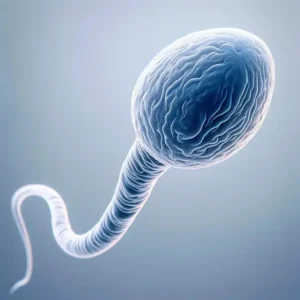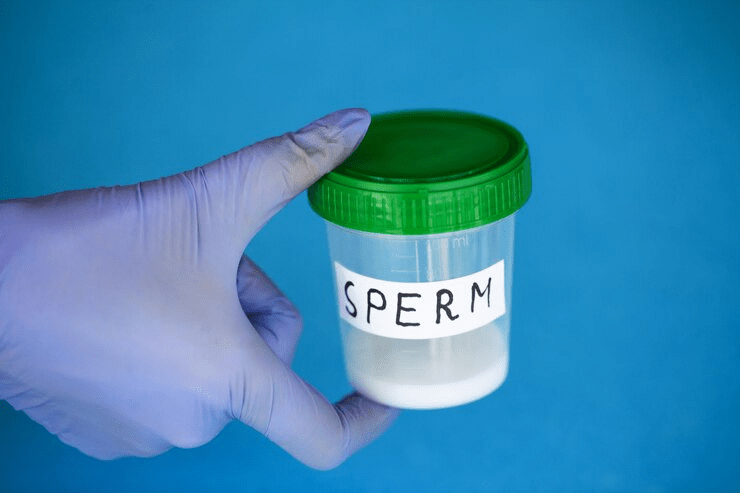
Azoospermia Causes, Diagnosis, and Treatment Options
Azoospermia is a medical condition that results in

When people think about sperm, they often wonder about its composition. A common question that arises is, “Is sperm 100% protein?” The short answer is no. Sperm is not purely protein. Instead, it is a complex biological fluid made up of a variety of components, including proteins, sugars, minerals, vitamins, and even fats. In this blog post, we’ll dive deep into what sperm consists of, the role of proteins, why this topic matters for male fertility, and how to maintain sperm health.
Let’s get started!
Sperm are microscopic cells produced in the male testes. Their primary role is to fertilize an egg, initiating the process of creating a new life. Each sperm cell consists of three main parts:
Sperm cells are carried in semen, a fluid produced by various glands like the prostate and seminal vesicles.
No, sperm is not 100% protein. While proteins are an essential part of sperm structure and function, they only make up a portion of it. Sperm cells and the fluid they travel in are made up of:
Thus, the belief that sperm is purely protein is a misconception.
Proteins are crucial for several reasons:
Without these proteins, sperm would not be able to perform their critical role in reproduction.
Since sperm travels in semen, it’s important to understand what semen is made of:
Semen is a nutrient-dense fluid, providing an optimal environment for sperm to survive and reach the egg.
The idea that sperm might be entirely protein may stem from the fact that proteins are a major class of biological molecules. Proteins are heavily involved in the structure and functionality of almost every cell in the body, including sperm. However, assuming that sperm is 100% protein overlooks the broader biological complexity.
Although sperm is not purely protein, a healthy intake of dietary protein is vital for sperm production and function. Here’s why:
Besides proteins, other nutrients play a huge role in sperm health:
Ensuring a balanced intake of these nutrients can significantly impact male fertility.
If you are concerned about sperm health, there are several proven ways to enhance it:
Focus on:
Moderate exercise improves hormonal balance and blood flow, boosting sperm production.
Water is a major component of semen. Dehydration can negatively affect sperm volume and motility.
Limit or avoid alcohol, tobacco, and recreational drugs. These can harm sperm DNA.
Chronic stress can disrupt hormone levels, leading to decreased sperm quality.
Avoid hot baths, tight underwear, and prolonged laptop use on your lap, as overheating the testes can impair sperm production.
Poor sleep patterns can lower testosterone levels and negatively impact fertility.
Q1: Is sperm edible and nutritious? While it does contain proteins, sugars, and minerals, the nutritional value of semen is extremely low due to the tiny quantities involved.
Q2: Can diet improve sperm quality? Yes. Studies show that men who eat a diet rich in antioxidants, vitamins, and healthy fats tend to have better sperm counts and motility.
Q3: How long does it take to improve sperm health? Sperm production takes about 64 to 74 days. Therefore, lifestyle changes may take about 2-3 months to show results.
**Q4: Can supplements help? **Some supplements like zinc, folic acid, and CoQ10 can improve sperm parameters, but it’s best to consult a healthcare provider first.
So, to answer the main question clearly: Is sperm 100% protein? Not. Sperm is a highly sophisticated cell composed of proteins, sugars, lipids, minerals, and more. Proteins are vital for their structure and function, but they are just one part of the complex makeup.
Understanding sperm composition helps highlight the importance of overall health in male fertility. Balanced nutrition, healthy habits, and a proactive lifestyle can significantly boost sperm quality, potentially improving fertility outcomes.
If you’re looking to improve your reproductive health, start with small, manageable changes today. Your future self will thank you.

Azoospermia is a medical condition that results in

The Jordanian Society for Fertility and Genetics recently

Prolistem for non obstructive azoospermia, Non-obstructive azoospermia (NOA)

Introduction Male infertility, especially caused by azoospermia, affects